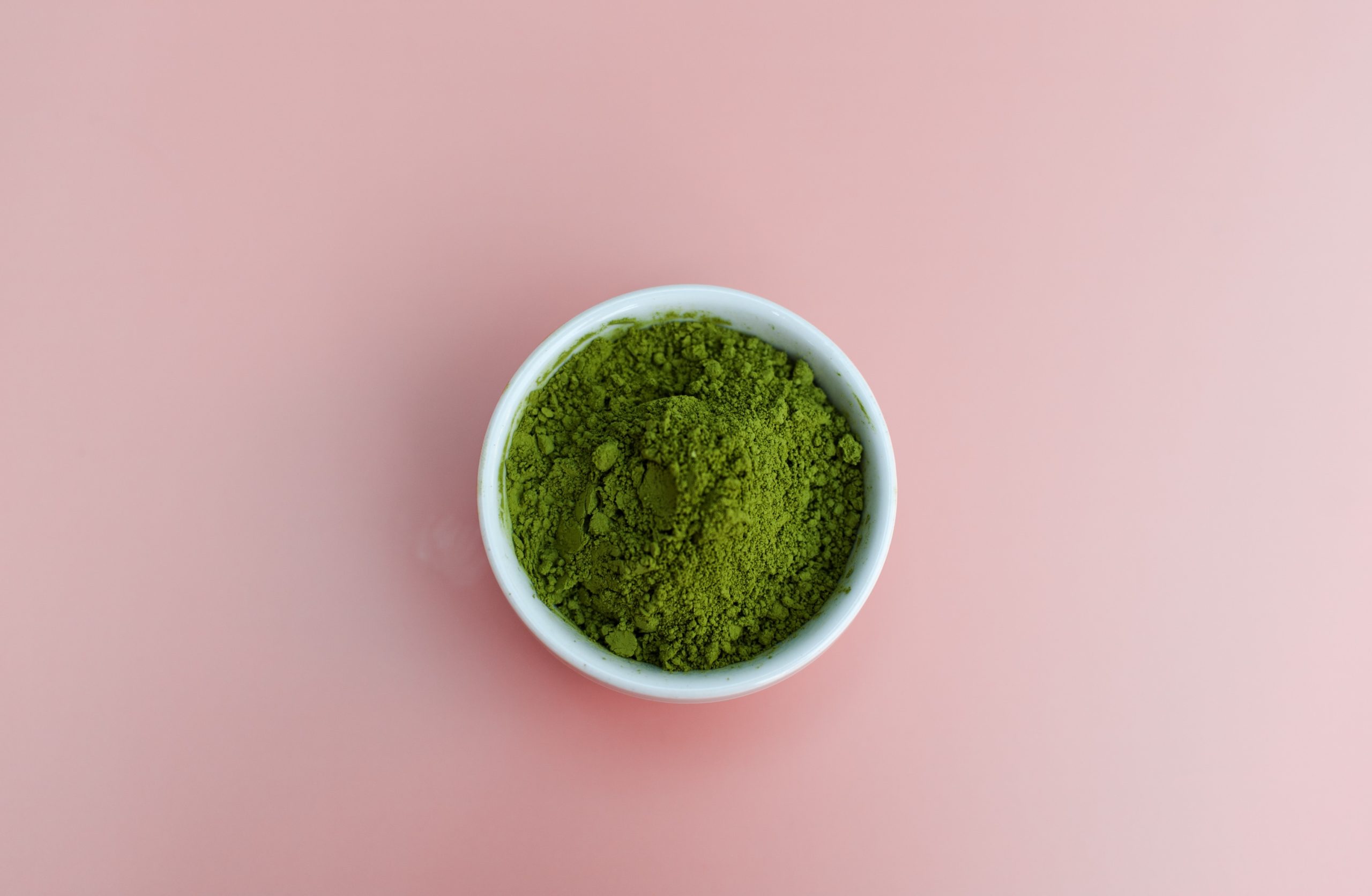Heads up! I’m NOT a doctor or nutritionist. I’m not giving you any medical advice or dietary recommendations here. Check with your doctor before you make any changes to your lifestyle, diet, or supplement regimen.
You wanna know one of the best things that happened to me when I found out I had hemochromatosis? I was forced to become about ten times healthier.
Sure, you could say I was “healthy” before I got diagnosed. I ate fruits and veggies, I worked out, I took a multivitamin.
But I also put a lot of crap into my body – I ate processed foods, and I LOVED bread. My weakness has always been salty & greasy foods, and I would let myself indulge in take & bake pizza from my neighborhood grocery store just a liiiitttttle too often.
When I got diagnosed with hemochromatosis, my doctor worked with me to make some important changes to my diet.
On top of the obvious things she said to me, like “girl DITCH that multivitamin with iron, and say buh-bye to all that enriched bread and pizza dough you love so much cuz’ it’s loaded with iron” – want to know the #1 thing my doctor recommended?

Drinking more tea. One of the teas she recommended most was green tea.
WHY GREEN TEA?
Google “healthiest beverage” and you’ll find that there’s a pretty strong argument that green tea is the winner. Green tea has been used as a natural medicine for thousands of years (and I really mean thousands! Green tea traces all the way back to 2737 B.C. when the Chinese emperor drank water that accidentally had a dead tea leaf boiled in it. The emperor loved the taste, and so a new style of beverage was born).
To make green tea from the Camellia sinensis plant, the leaves are dried and then steamed. This process of drying and steaming preserves a lot of the nutrients in the tea leaves which is why green tea has big lineup of medicinal properties.
So ya wanna know some of the scientifically proven effects of drinking green tea?
- Helps you lose fat
- Enhances your physical performance
- Makes you less likely to die
- Gives you better breath and fewer cavities
HELPS YOU LOSE FAT

Check out any popular weight loss supplements or products marketed as skinny or slimming, and you’re pretty much guaranteed to see green tea somewhere on the ingredient list.
That’s because green tea boosts your body’s ability to burn fat.
One study showed that green tea increases “fat oxidation” (fancy term for burning fat) by 17%. And green tea is especially helpful for losing fat in the in the tummy area.
ENHANCES YOUR PHYSICAL PERFORMANCE

Green tea contains caffeine (about 1/3 as much coffee…give or take).
There have been tons of studies on the effects of caffeine on the body, especially when it comes to sports. Caffeine enhances people’s physical performance by 11%–12%. It does this by making fat more available for the body to use as an energy source. Because your body has more access to energy, you run faster, jump higher, cycle longer, etc.
MAKES YOU LESS LIKELY TO DIE

Want to live till you can celebrate like this ol’ lady?
A study of senior-aged Japanese folks found that those who drank the most green tea were 76% less likely to die over a 6-year period.
Another study of over 40,000 Japanese adults found that the people who drank the most green tea were significantly less likely to die during the 11-year study.
So, keep drinkin’ green tea to avoid the grim reaper and live a little longer.
GIVES YOU BETTER BREATH AND FEWER CAVITIES

There’s an especially gnarly type of bacteria that lives in your mouth – Streptococcus mutans. It creates the plaque on your teeth and plays a major role in creating cavities and tooth decay. Green tea slows down the growth of Streptococcus mutans and other bacteria, which is why drinking green tea is linked to:
- improved dental health
- lower chance of developing cavities
- better breath
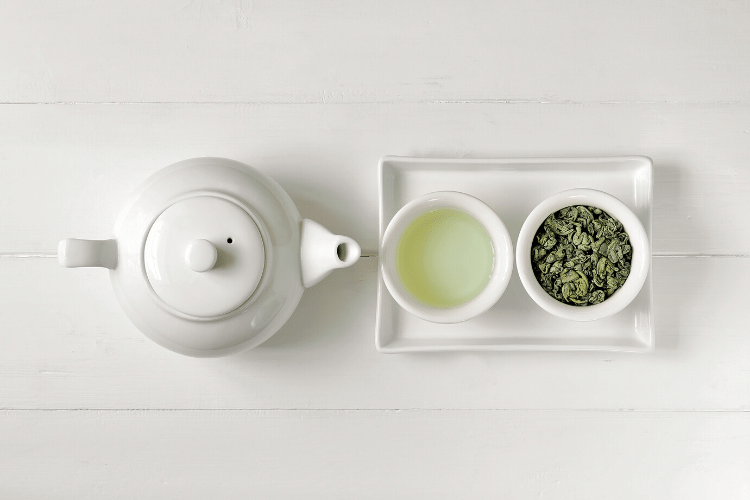
GREEN TEA FOR HEMOCHROMATOSIS
Alright – we’ve got a good background on green tea and some of it’s more well-known benefits, from burning fat to nicer teeth.
But there’s a reason (6 reasons, actually) my doctor recommends that anyone with hemochromatosis drink green tea.
And it’s not just my doc:
- Dr. Eric Lewis, author of Holistic Help for Hemochromatosis, lists green tea as one of the most important elements of a hemochromatosis diet.
- The Iron Disorders Institute encourages hemochromatosis patients to drink tea with meals in Diet Recommendations for Hemochromatosis.
- In Nutrition Support for Hemochromatosis Therapy from Sanford Medical Center, tea is listed one of the “foods to eat MORE OF” for anyone with hemochromatosis.
- In Healthy Eating and Haemochromatosis, The Haemochromatosis Society recommends adding more tea to the hemochromatosis diet.
So you’re probably wondering, what are the health benefits of green tea that directly relate to hemochromatosis?
Here ya go.
TOP 6 BENEFITS OF GREEN TEA FOR HEMOCHROMATOSIS
- Combats oxidation
- Kills bacteria and viruses
- Puts you in a better mood
- Helps prevent Alzheimer’s and Parkinson’s
- Takes care of your heart
- Boosts liver health

1. COMBATS OXIDATION

Have you ever tried to put a key in a rusty lock? I live in the Pacific Northwest where it rains…a lot. I can tell you from experience with my rusty bike lock – it does not work well!
Rust forms because of “oxidation” – when the metal on the lock reacts with the oxygen and water in the air – slowly transforming the metal from a shiny sleek silver to a corroded lumpy red.
Similar to rust forming on a piece of metal because of exposure to the elements over time, when you expose your body to too much iron over time, your body also experiences “oxidation.” Eventually, your organs stop functioning, just like that rusty old bike lock.
Oxidation inside of you happens when the surplus of iron iron in your blood, cells, and tissues reacts with oxygen and other elements in your body. This type of reaction creates free radicals.
Free radicals are dangerous molecules that continue to react with other cells in your body and cause damage – setting off a chain reaction leading to more damaged cells.
If the concept of free radicals and oxidation seems foreign and tricky to understand – you’re not alone.
As long as you can visualize a patch of rust growing on a piece of metal, you can apply that concept to damaged cells multiplying and growing within you in a similar way – that’s oxidation.

Oxidation leads to inflammation (your tissues and organs get inflamed because they’re damaged). Inflammation might originally show up as achey joints, stomach pains, or feeling tired. As the oxidation spreads and your inflammation becomes worse, you may experience a whole bunch of symptoms from premature aging to joint problems to diabetes to cancer.
Fortunately, green tea leaves are rich with polyphenols – plant chemicals that fight oxidation. In fact, green tea is considered to be one of the top foods richest in polyphenols.
Almost all of green tea’s health benefits are directly tied to these polyphenols. That’s because polyphenols have antioxidant properties – aka they’re “anti-oxidation.”
Green tea contains one type of polyphenol in particular that is especially helpful:
Catechins.
Catechins are the BIG DEAL polyphenol in green tea. Considered to be the major bioactive component of green tea, catechins are powerful antioxidants that fight oxidation by reducing the formation of free radicals in your body.
Because catechins are able to slow down oxidation, they also help to decrease the inflammation that comes with it.
So if you want to protect yourself from rusting from the inside out, stop at the tea aisle next time you’re in the grocery store and treat yourself to some green tea.
2. KILLS BACTERIA AND VIRUSES

Having high iron levels makes you more susceptible to infections. When pathogens like bacteria and viruses invade (for example – if you eat or drink contaminated food or water, or if you sit next to someone who’s coughing and wheezing, or if you have a cut that gets infected) the pathogens take some of the extra iron you’ve got hanging around – and they use that iron for themselves!
Listen to this…
In 2003, researchers experimented with iron supplementation for kids in Tanzania. However, this trial was STOPPED because researchers quickly learned that the kids who took iron pills were at a higher risk of developing malaria compared to the kids who took the placebo containing no iron. As a result of this experiment, the World Health Organization decided to pull iron off their list of diet recommendations for children in a malaria-prone areas.
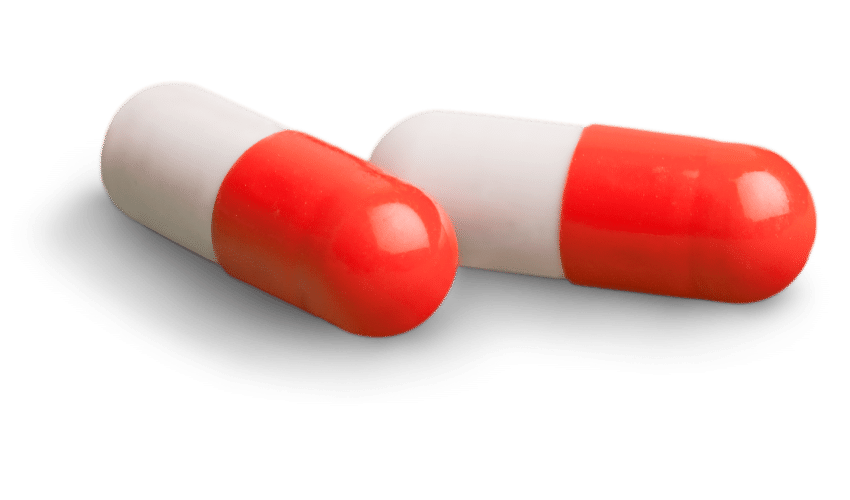
Iron also worsens tuberculosis. In one study, when TB patients were given iron supplements, they did worse off than the patients not given any iron.
After following adults infected with HIV for 11 years, researchers in Gambia concluded that elevated iron levels are associated with a higher rate of death from HIV.
High iron levels exacerbate other infections and illnesses too. Here’s a list of diseases and pathogens known to be “stimulated” by excess iron:
- Malaria (caused by a parasite)
- Tuberculosis (caused by bacteria)
- HIV (virus)
- E. coli (bacteria)
- Candida (fungi – known for causing yeast infections)
- Streptococci (bacteria – known for causing cavities and bad breath)
- And plenty more
No bueno.
The good news is that green tea helps combat several of the infections that people with high iron levels are more susceptible to.
Green tea has the potential to…

- fight malaria.
- lower your risk of tuberculosis.
- inhibit HIV growth.
- destroy E. coli.
- prevent candida yeast cells from attaching to one another.
- be just as effective as the “gold standard” oral antiseptic
- (and fight off many other germs and pathogens)
More and more research confirms the antimicrobial effects of green tea and green tea catechins on everything from bacteria to viruses to mold to parasites. Green tea lowers your risk of getting sick, sometimes even preventing infections and illness altogether.
3. PUTS YOU IN A BETTER MOOD

Time to get your nerd on and listen up.
Green tea contains a special amino acid called L-theanine.
L-theanine increases the activity of a chemical called “GABA” within your brain. GABA calms your nervous system, relieving you from feelings of fear and anxiety.
L-theanine also increases dopamine levels. Dopamine helps you with a lot of things (like movement and agility) but it’s most known for being one of the major chemicals critical to creating happiness.
Lastly, L-theanine stimulates your brain to make alpha brain waves, pulling you into a state of deep relaxation and mental alertness achieved through meditation. Scientists call this state “alert relaxation” because even though you’re calm, you’re not drowsy.
To sum it up:
- L-theanine = more GABA = less fear and anxiety
- L-theanine = more dopamine = more happy feelings
- L-theanine = more alpha waves = more “alert relaxation”
Why is all this mood-boosting stuff so great for hemochromatosis?
According to Haemochromatosis Australia, symptoms of hemochromatosis include severe irritability and even depression.
The Canadian Hemochromatosis Society also points out that mood swings and other personality changes like severe depression or anger are side effects of HH.
So if you’ve got high iron levels and you’re feeling like this:

But you want to feel like this:

…L-theanine in green tea may be able to help.
4. HELPS PREVENT ALZHEIMER’S AND PARKINSON’S

Alzheimer’s is the most common neurodegenerative disease in the world. Parkinson’s is the second most common.
Similar to hemochromatosis, both of these diseases have relationships with iron, specifically iron accumulating in the brain.
In Alzheimer’s, excess iron causes plaque to form between neurons in your brain. Plaque is one of the telltale signs of Alzheimer’s – it prevents your neurons from talking to one another, eventually leading to memory loss.
In Parkinson’s, excess iron affects the neurons in your brain that produce dopamine – these neurons begin to malfunction and die. Dopamine plays a number of roles in your body – it wears many hats! You already recognize it as a “happy” chemical, since it’s best-known for the part it plays in creating your mood. What you might not know is that dopamine also impacts your motor abilities. When your dopamine-producing nerve cells die because of too much iron in the brain, that’s when people start to see the tremors and shakiness associated with Parkinson’s.
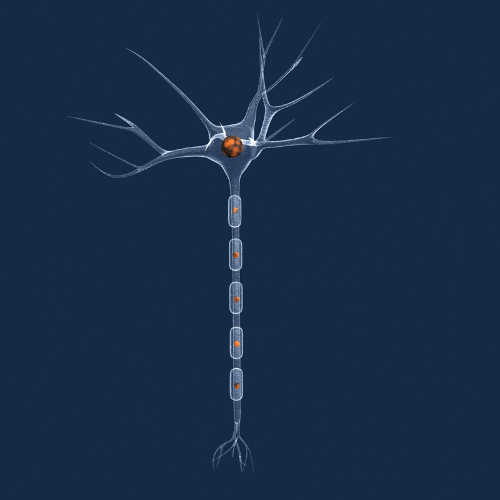
Removing iron from the body to lower brain iron levels has been suggested as a therapy for both Alzheimer’s and Parkinson’s, which is why iron-chelating drugs are sometimes incorporated into the treatment plan for these diseases.
Removing iron from the body – sounds an awful lot like the treatment for hemochromatosis, eh?
Strangely, there are a lot of similarities between these neurodegenerative diseases and hemochromatosis because of their ties to iron.
Now, before you freak out and convince yourself that you’re going to get one of these diseases because you have hemochromatosis, know this:
Hemochromatosis doesn’t necessarily cause iron accumulation in the brain. The iron overload from hemochromatosis usually ends up in your liver, pancreas, or heart. Scientists are still undecided on the relationship between hemochromatosis and these neurodegenerative diseases, and there are conflicting reports about the role hemochromatosis plays in Alzheimer’s and Parkinson’s.
While there are studies that show no correlation between hemochromatosis and neurodegeneration, there are other studies, reviews, and case reports that show that people with hemochromatosis can have an enhanced risk for both Alzheimer’s and Parkinson’s even though hemochromatosis may not be directly related to iron deposits in the brain.
Some scientists think the combination of your hemochromatosis genes paired with environmental factors like stress, diet, lifestyle, other genes you’ve inherited, etc. are an indicator of your likelihood to develop one of these neurodegenerative diseases.
Even though the jury’s still out, if you’d like to take precautions and shield your brain for the long-term (just to be safe), then you’ll want to take a closer look at EGCG in green tea.

- EGCG has been pinpointed for its iron-chelating abilities. It literally pulls iron out of your brain. P.D. Mangan, author of Dumping Iron, says “EGCG has been shown to be as potent an iron chelator as the prescription iron-chelating drug desferrioxamine” – and he’s right.
- EGCG thwarts the build-up of plaque between neurons, which helps defend against Alzheimer’s.
- EGCG may assist your brain in making dopamine(and helps dopamine travel to different parts of your brain), which in turn eases your body’s movements and prevents tremors associated with Parkinson’s.
- EGCG protects the neurons in your brain and stops them from degenerating.
- EGCG slows down the progression of both Alzheimer’s and Parkinson’s in anyone who already has the disease.
Need I say more? Go get yourself some EGCG…stat!
5. TAKES CARE OF YOUR HEART

The heart is one of the most common organs to be affected in someone with iron overload.
In fact, abnormal heart rhythms (called arrhythmias) are a symptom of hemochromatosis. Arrhythmias may be signs of a heart problem called cardiomyopathy (when your heart has a hard time pumping blood). Cardiomyopathy is a type of heart disease that can be caused by hemochromatosis as a result of of iron deposits in the heart.
This iron-derived cardiomyopathy has been dubbed “cardiac hemochromatosis“ and on top of heart arrhythmias it can also cause shortness of breath. Eventually, cardiac hemochromatosis can lead to heart failure (when your heart can’t pump enough blood to supply your whole body).
How does green tea help?
You can point to catechins and the infamous EGCG as the reason why green drinkers have a lower risk of heart disease. EGCG specifically has been pinpointed as having therepautic properties for the heart.
Because of EGCG’s anti-inflammatory and antioxidant properties, it’s been studied as a remedy for several types of cardiovascular issues, and it’s been suggested as a treatment for heart arrhythmias.
In fact, in a study of 801 people – small amounts of green tea helped protect against heart arrhythmias.
As for the shortness of breath that can accompany hemochromatosis…
The EGCG in green tea can actually decrease inflammation in the lungs, and the caffeine it contains opens up airways, making it easier to breathe.

So if you’ve been diagnosed with cardiac hemochromatosis, or if you’ve experienced abnormal heart rhythms & difficulty breathing, or if you just want to be gosh-darn healthy and protect your heart – then it could be time to pour yourself a cup of green tea.
6. BOOSTS LIVER HEALTH

Ahhh…the liver: the organ none of us really understands. It looks weird. And it’s hard to visualize (Be honest: if you had to point to the exact location of your liver in your body, would you know?). We don’t feel our liver the same way we feel our heart pumping, our lungs breathing, or our stomach churning.
Most people don’t think much (or at all) about their liver. While it’s common for people to be educated on “heart healthy foods” and even “brain fuel” or “gut health,” the liver is a forgotten organ who’s “health” we don’t give the time of day.
Your liver is the reason you’re still standing even though you’ve trashed it time and time again.
Admit it:
You’ve eaten junk food loaded up with additives and preservatives. You’ve pounded energy drinks with weird coloring and chemicals to keep you awake. You’ve inhaled pollutants like car exhaust or fumes from harsh cleaning supplies. You’ve smoked a cigarette. You’ve written a to-do list on your hand with pen ink. You’ve eaten factory-farmed meat that contained hormones and antibiotics. You’ve worn cheap lipstick that contained lead and a whole host of other ingredients you couldn’t pronounce. You’ve had one (or two) too many cocktails on a night out.
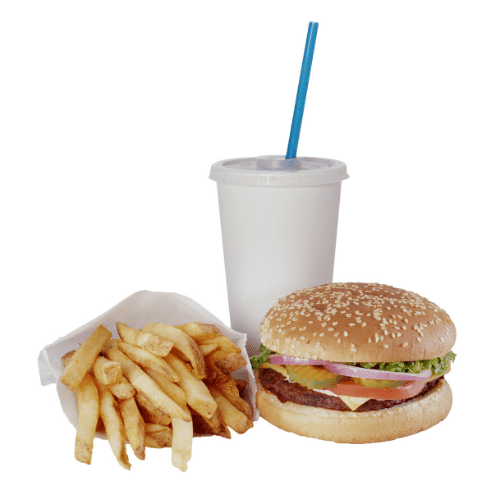
All of these things contained toxins that were potentially harmful to your health. But you didn’t bat an eye about it. And that’s because you didn’t need to. Your pal – the liver – flushed all these toxins out.
If you have hemochromatosis, you’ve got to take extra good care of your liver.
Your liver is where most of your excess iron gets deposited, causing oxidation.
If you’ve read this whole blog post (and holy sh*& that’s impressive), then you’ve already read about the relationship between oxidation and hemochromatosis.
Too much oxidation in your liver means your liver stops filtering out toxins.
If oxidation in your liver continues over a number of years (as is often the case with hemochromatosis because many people don’t end up getting diagnosed until later in life) you can eventually end up with liver cirrhosis or liver cancer.
So, how do you “stay in touch” with your liver? How do you know if your liver is still doing it’s job, or if there’s been too much oxidation?
The answer: LIVER FUNCTION TEST
A liver function test will measure your liver enzyme levels. This is an essential measurement for anyone with hemochromatosis.
Having high liver enzymes are a sign your liver’s cells are injured or inflamed. Injured and inflamed liver cells are caused by oxidation from excess iron. These damaged cells leak higher amounts of liver enzymes into the bloodstream than healthy liver cells.
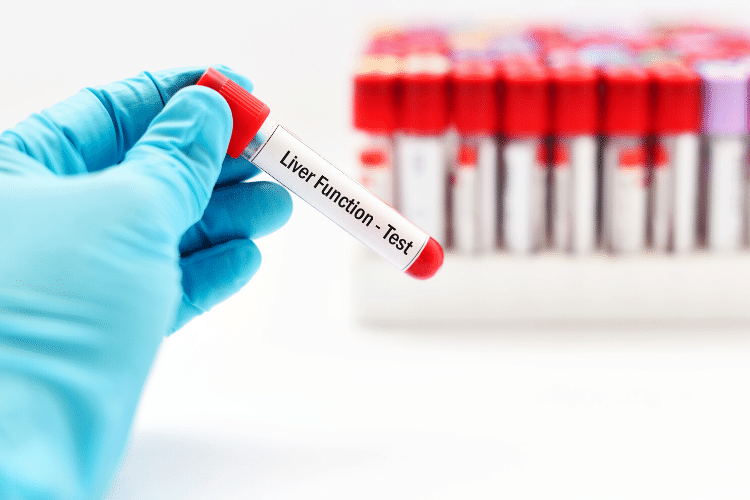
Most doctors will do a liver function test once they find out you have hemochromatosis. If not, you can always ask for one. You can also take a liver function test at home to determine your liver enzyme levels.
That’s why hemochromatosis can lead to high liver enzymes.
So…whatcha gonna do?
The answer: GREEN TEA
One study found that drinking green tea improves blood markers of liver health, including liver enzyme levels.
Another study discovered that drinking green tea not only improves liver enzyme levels, but can also reduce oxidation in the liver.
CHOOSING GREEN TEA
Similar to coffee – with light roast, medium roast, dark roast, French roast, espresso, nitro coffee, green coffee, decaf coffee, instant coffee, etc. – green tea can have different flavors, textures, and aromas. From smoky gunpowder to fragrant jasmine to delicate matcha – you’ll want to experiment to find your favorites.
On top of finding a variety of green tea you like, the most important thing is to read the label and check the ingredient list – lots of teas marketed as “green teas” contain other ingredients as well. While these other ingredients can add to the flavor and variety, they may backfire when it comes to your health.
For example, ascorbic acid (fancy term for vitamin C) is commonly combined with green tea products. Herbal teas are also frequently blended in, like hibiscus or rose hip tea which are high in vitamin C. Other popular additions are orange zest, lemon peels, and dried fruits. Because these ingredients all contain high levels of vitamin C, they will force your body to absorb more iron – obviously that’s NOT something you want.
That’s why it’s best to find 100% green tea!
And if it’s in your budget, try to choose a higher quality brand of green tea. Quality green tea contains more polyphenols, EGCG, and L-theanine than lower quality brands because the tea leaves are grown, harvested, and processed better, which preserves their nutrients.
And it’s not just the ingredients in your tea that you need to think about – the ingredients in your tea bags are just as important. Many tea sachets leak an alarming amount of microplastics into your cup, which may have consequences for your health. Certain types of tea bags can interfere with the antioxidant capacity of your tea.
Make sure you drink loose leaf tea or use tea bags that are toxin and plastic-free.
HOW DO YOU TAKE YOUR TEA?
Except for the OCCASIONAL oat-milk matcha latte (because…resistance is futile!), SAY NO to both milk and sugar more often than not when you drink your tea.
Now you might be thinking – milk has calcium, and calcium blocks iron, right? – so shouldn’t I pour milk into my tea to block iron?
Sorry to burst your bubble, but adding milk to tea does nothing to improve tea’s iron-blocking abilities.
On top of that, studies show that milk actually reduces the antioxidant qualities of your tea! That’s because the proteins in milk can bind to the tea polyphenols – which lowers their antioxidant capacity.
Keep the antioxidants and ditch the milk.
As for sugar…while it might be tempting to sweeten your tea, added sugar is a “no-no” for the hemochromatosis diet. The fructose in sugar improves iron absorption, so it can counteract the iron-chelating qualities in your green tea. If you really do want to sweeten it up, make sure you opt for a low-fructose sweetener – try a few drops of stevia or monk fruit extract, or a small spoonful of maple syrup.
MY FAVORITE GREEN TEAS
Here’s a list of my top green tea choices. All of these teas meet my standards. They’re 100% green tea with no additives. The companies behind them follow legit testing procedures to ensure their tea is the real deal. And they taste good.
Check ’em out and let me know what you think!
For every day green tea drinkin’ I like green tea blends that include a few different types of green tea to create a balanced flavor. This one’s a blend of green teas including Sencha, Oothu, Suoi Gang, and Matcha. An easy-drinking tea, it’s got a light flavor that’s not too overpowering. The company behind this tea, Pukka, has a slew of certifications behind its name – Certified Organic, B corporation, Fair for Life, FairWild and 1% for the Planet – and they carefully source their teas from all over the world.

If you’re sensitive to caffeine but still want the benefits of green tea, or if you want to sip on some green tea later in the afternoon or evening without worrying about being wired all night, decaf green tea is the best option for you. In my experience, I’ve always found a great value for high quality teas with Yogi. Yogi Pure Green Decaf is no exception. Yogi’s Responsible Sourcing Program requires that their tea suppliers are regularly audited for best practices in producing and packing the tea. They also perform microbiology tests to make sure their tea is free from any contaminants, as well as identity confirmation tests to verify their tea is pure with no filler ingredients.

Matcha green tea is trending these days – you can find it at most coffee shops since matcha lattes are getting more and more popular. Made from ground tea leaves, matcha comes in powder form. To prepare matcha you just whisk the powder with warm water and let it dissolve (use a matcha whisk or the tea can get clumpy). Because you’re consuming the tea leaves themselves, matcha is more potent than other green teas. Drinking matcha will give you more caffeine and antioxidants than other green teas.
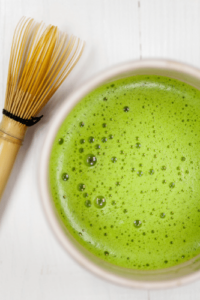
My choice for matcha is Kenko. It’s a small company dedicated to making fresh and organic matcha in small batches.
Kenko offers both ceremonial grade and culinary grade matcha, so depending on your needs, try one or both!
Ceremonial grade matcha is higher quality – intended for drinking as plain tea, straight-up with nothing added. If you get a good ceremonial grade matcha, it should be a bright green color. It’s made from the youngest tea leaves that have been ground to an incredibly fine texture. It should dissolve easily into water for a smooth texture and delicate flavor.
Culinary grade matcha is meant for cooking, baking, tea lattes, etc. It’s a bit more bitter than ceremonial grade, and it doesn’t have the same vibrant green color. You can get creative and incorporate it in your diet in ways you wouldn’t normally think to use tea – I love adding it to smoothies and salad dressings. (You can also drink culinary grade matcha as regular tea – that’s totally fine!)
Jasmine green tea is green tea infused with jasmine blossoms to give the tea a flowery aroma – and it’s one of the more popular green teas because of its slightly sweet and floral taste. When it comes to drinking jasmine, I prefer Numi because they use real jasmine flowers to scent the tea, whereas a lot of other tea brands use synthetic flavoring – ech! Numi’s certified organic, fair trade, and high quality grade teas never disappoint. This brother-sister company also has a powerful social justice mission with their H2OPE project, which brings clean drinking water to farming communities around the world.

If you like buying in bulk to save time and money, or if you prefer using a tea infuser instead of tea bags, then I recommend you get yourself some loose leaf tea. A little can go a long way because you decide exactly how much you’d like to steep. My favorite loose leaf green tea is “gunpowder.” It’s made with tea leaves that have been rolled to look like small pellets or pearls, which slowly unfurl as they absorb hot water. If for no other reason than the satisfaction of watching the rolled green tea pearls open up, you’ve got to try this tea! While you can purchase gunpowder already divvied up into tea bags, it’s more fun to try it in loose leaf form to see the action happen. Use a glass tea infuser so you can watch and enjoy! Heads up, gunpowder has a bolder and smokier flavor than other green teas – fitting for its name.


WHAT ABOUT GREEN TEA SUPPLEMENTS?
Green tea supplements are powerful because they’re much more concentrated a cup of green tea.
Because of this, they can have a stronger and faster effect on you. If you need some extra mood boosting L-theanine or a powerful dose of disease-killing, organ-protecting superhero antioxidant EGCG, consider supplementing.
Supplements are also a nice option if you don’t like the flavor of green tea or you just don’t have the time to brew yourself a cup – but you still want the perks.
Pure Encapsulations L-Theanine
If you want the mood-boosting and stress-relieving benefits of L-theanine in green tea ASAP, then this one’s for you.

Pure Encapsulations Green Tea Extract (decaf)
This green tea extract is 90% green tea catechins (and 70% of those catechins are EGCG!). Full of antioxidants to help prevent oxidation and protect your organs – green tea extract can be useful for anyone with hemochromatosis. It’s also caffeine free so you can take it at any time of day.

Just as with choosing green tea, it’s critical that you choose a high quality supplement to get effective results. I use Pure Encapsulations supplements because all of their ingredients are tested for purity and potency by third-party laboratories. Their supplements never contain coatings, binders, shellacs, artificial flavors, artificial sweeteners or colors, fragrance, wheat, gluten, nuts, egg, preservatives, hydrogenated oils, or magnesium stearate. Pure Encapsulations has an open-door policy for any physician who wants to visit at their humidity, temperature, and dust-controlled facility. That’s why their products are trusted by many doctors and medical providers – which is actually how I found out about Pure Encapsulations – through my doctor – who recommended them to me.
Be careful when taking supplements. Make sure you follow the dosage instructions on the bottle – don’t overdo it! Depending your personal situation and health conditions, supplements may not be best for you. Always check with your doctor!
PRECAUTIONS
Consuming green tea or green tea supplements around mealtime can inhibit absorption for a few nutrients like folic acid and vitamin D. Also, the caffeine in green tea is a diuretic. Diuretics make you pee – essentially flushing nutrients out of your body at a slightly faster rate than you’d normally lose them – meaning you’ll want to replace nutrients on a more frequent basis if you’re a regular green tea drinker.
That’s why it’s important to eat a high quality diet and ensure you consume adequate nutrients. Your doctor might recommend that you take vitamins or supplements if you’re deficient in anything.
SHOULD ANYONE AVOID GREEN TEA?
Green tea isn’t for everyone. There are some people who may want to avoid green tea altogether.
CAFFEINE SENSITIVE FOLKS
Green tea contains roughly 1/3 the amount of caffeine that’s in a cup of coffee. If you’re sensitive to caffeine, then you’ll want to limit yourself accordingly (depending on how much caffeine you know you can handle) or opt for the decaf-option.
ANYONE WITH ACID REFLUX
Green tea’s polyphenols stimulate stomach acid. While this is generally no big deal (and can actually be a good thing for many since it aids digestion) if you have acid reflux, then take it easy with green tea. You’ll probably be fine with a small amount, but don’t go wild.
PREGNANT WOMEN AND WOMEN TRYING TO CONCEIVE
Because green tea’s high polyphenol content inhibits the absorption of folic acid, and folic acid is critical to a baby’s healthy development, if you are pregnant or trying to conceive you’ll want to lower your green tea intake. The caffeine in green tea can also affect a growing baby, so only small amounts are recommended.
PEOPLE WITH LIVER PROBLEMS
If you already have liver issues or liver damage, your doctor might advise that you avoid green tea and green tea supplements. It’s possible that green tea may aggravate your health problems, depending on your specific situation.
WHAT DO YOU THINK?
Adding more green tea into the hemochromatosis diet is a simple change – one that’s easy to start incorporating into your life! From combatting oxidation, to killing bacteria and viruses, to putting you in a better mood, to helping prevent Alzheimer’s and Parkinson’s, to taking care of your heart, to liver health – you’ve got 6 amazing reasons to drink green tea!
Have you or your family members tried adding more green tea into your life since getting diagnosed with hemochromatosis? I’d love to hear your thoughts. Leave a comment below!
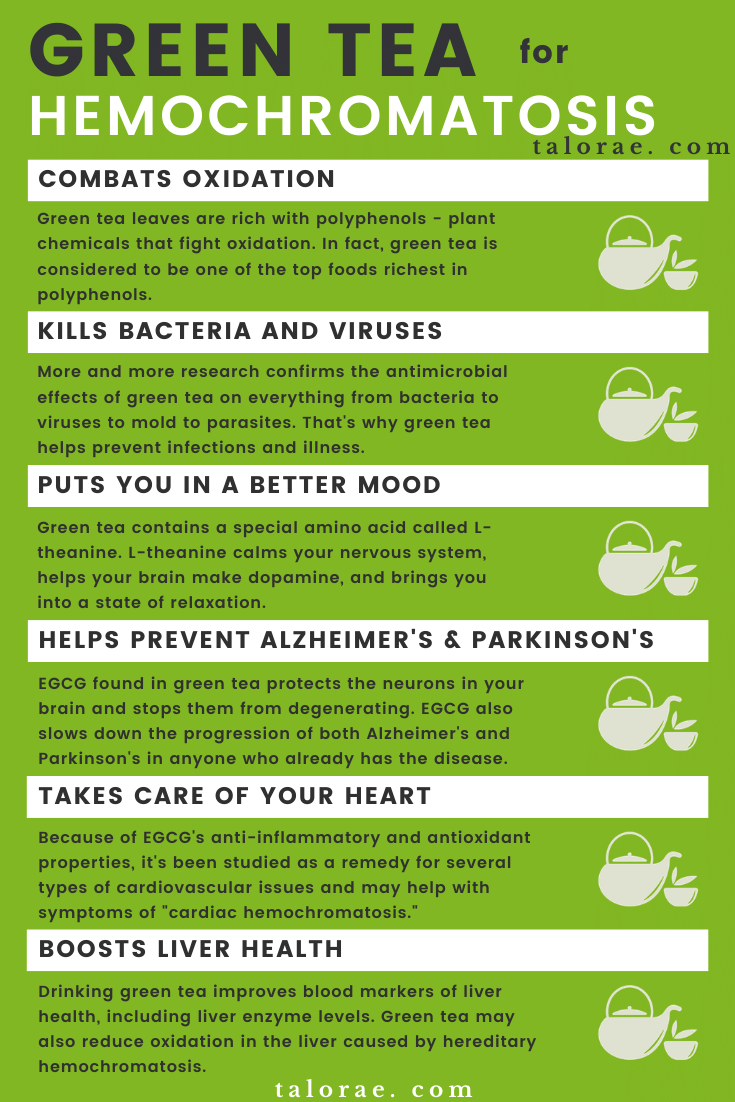
The views expressed in this post are for informational purposes only. This post is not, nor is it intended to be, a substitute for professional, medical, or nutritional advice, diagnosis, or treatment, and should never be relied upon for professional, medical or nutritional advice, diagnosis, or treatment.
No content on talorae.com, including but not limited to pictures, graphics, videos, and text, may be republished or distributed, for financial gain or not, without my written permission.
As an Amazon Associate I earn from qualifying purchases. The above content may contain affiliate links, meaning I do get a commission when you make a purchase through those links. There is no additional cost to you. Please read my disclaimer for more info.
